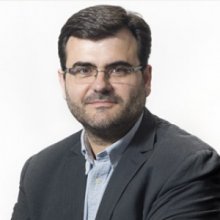Images
Participants

Contact

First event in the series “Barcelona Conferences on Epigenetics and Cancer: Challenges, Opportunities and Perspectives”, promoted by CRG, IBMB-CSIC, IMPPC, IDIBELL and IRB Barcelona.
On 21 and 22 November, national and international experts in epigenetics and cancer will come together at the “CosmoCaixa Barcelona” in a conference organized by B·Debate and the Institute of Predictive and Personalized Medicine of Cancer (IMPPC, Spanish acronym). In this conference series, the participants, among them Eduard Batlle, coordinator of the IRB Barcelona Oncology programme, will discuss the fundamental aspects the biology and epigenetics of cancer and the possibilities to exploit this knowledge to develop new treatments for cancer.
Cancer is a process that involves the growth and uncontrolled spread of cells, which can reach practically any part of the body. The tumour usually invades surrounding tissues and can cause metastasis to distant parts of the body. The WHO forecasts that deaths caused by cancer will continue to increase, reaching 13.1 million in 2030. Until only a few years ago, it was thought that cancer was caused only by defects in the genes themselves.
Researchers have recently discovered that some kinds of cancer arise as a result of changes in the way genes are expressed, without alteration of the genetic information that these genes hold.
The term epigenetics can be defined as the hereditary information that is not based on the DNA sequence. In fact, it refers to a wide range of molecular mechanisms that affect the function of genes by activating or deactivating them. These changes have long-term consequences that can persist and can be inherited. It is the epigenetic memory of the cell that defines its identity and behaviour. This concept is best reflected by the fact that a single stem cell can give rise to the 200 different types of cell found in a complex organism. Although all the cells are genetically identical, they can perform very different and specialized activities, for example a neuron and a muscle cell are not the same. Epigenetic changes thus occur without any alteration of the DNA sequence and can be triggered by several factors, such as environmental factors (for example the composition of the air that we breathe), age or type of diet.
Recent studies suggest that in some cases a cancer initially triggered by a mutation in the DNA increases the probability of metastasis caused by induced epigenetic changes. In this context, a genetic mutation triggers cancer, but the epigenetic alteration promotes its progression.
Research in the field of gene therapy could, in the future, allow the treatment and prevention of some kinds of cancer. The ambitious Human Genome Project has proved to be only the beginning of the quest to understand the molecular model of life. Attention is currently also focused on the study of the epigenome.
The objective of these B·Debate conferences is to reveal how these challenges are being tackled from research centres.
B·Debate- International Centre for Scientific Debate Barcelona is an initiative promoted by Biocat and the “Obra Social "la Caixa" that aims to provide answers to the challenges and needs of society in the field of life sciences by organizing top-level international meetings.
"Barcelona Conference on Epigenetics and Cancer: Challenges, Opportunities and Perspectives" is the first in a series of conferences that will be held in Barcelona over the next five years. This initiative is promoted by five research centres in Barcelona, IRB Barcelona, CRG, CSIC, IDIBELL and IMPPC. These conferences seek to become an international reference in this field. The first conference will be co-chaired by Dr. Manuel Perucho (IMPPC) and Dr. Marcus Buschbec (IMPPC).
About IRB Barcelona
The Institute for Research in Biomedicine (IRB Barcelona) pursues a society free of disease. To this end, it conducts multidisciplinary research of excellence to cure cancer and other diseases linked to ageing. It establishes technology transfer agreements with the pharmaceutical industry and major hospitals to bring research results closer to society, and organises a range of science outreach activities to engage the public in an open dialogue. IRB Barcelona is an international centre that hosts 400 researchers and more than 30 nationalities. Recognised as a Severo Ochoa Centre of Excellence since 2011, IRB Barcelona is a CERCA centre and member of the Barcelona Institute of Science and Technology (BIST).




